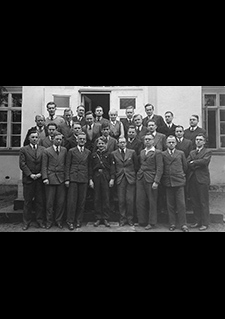Illegal Theological Education
The Confessing Church needed a theological seminary of its own in order to defend its independence from a church compliant with the state. In the spring of 1935, Bonhoeffer became the founding director of the Berlin-Brandenburg theological seminary intended to prepare Confessing Church vicars for parish ministry. Barth’s student Wilhelm Rott became dean of studies.
After a brief starting phase in Zingst in Pomerania, a closed schoolhouse in Finkenwalde near Stettin was found as a seminary facility. In addition, a “House of Brethren” was established, in which earlier graduates continued living in spiritual community. After the Gestapo sealed the seminary in 1937 because it was apt to jeopardize the standing and good of the state, courses were resumed secretly under the guise of communal vicarages in regional church congregations in Farther Pomerania until March of 1940.
In 1981, Bishop Albrecht Schönherr, a former student at Finkenwald, described the motivation thusly: All of us had taken the risk of a fairly insecure life upon ourselves. What sustained and supported us was the conviction that the Confessing Church Synod in Barmen in the summer of 1934 had spoken the truth with its six theses and that the synod in Dahlem in the fall of 1934 had drawn the consequences for the church from them.
This was driven by a demand for resolute discipleship of Christ. Bonhoeffer’s work “The Cost of Discipleship”, published in 1937, arose out of classes at Finkenwald in this spirit: There can be no other leader (Führer) than Christ, was its tenor. As risky as underground existence might be, the radical Confessing Church’s path was held to be true discipleship of Christ.
Bonhoeffer was therefore incensed when individual vicars moved to church governments compliant with the state in order to be examined and ordained there legally. He wrote: Whoever knowingly severs himself from the Confessing Church severs himself from salvation. His lengthy article “On the Question of Church Membership” (June 1936) provoked fierce criticism. Jokes were made about this strict course: Whoever does not have a red ticket (i.e. the Confessing Church membership card) will not get into heaven. Bonhoeffer’s radicalness threatened to isolate his students and himself.
Source / title
- © by Gütersloher Verlagshaus, Gütersloh, in der Verlagsgruppe Random House GmbH, München

